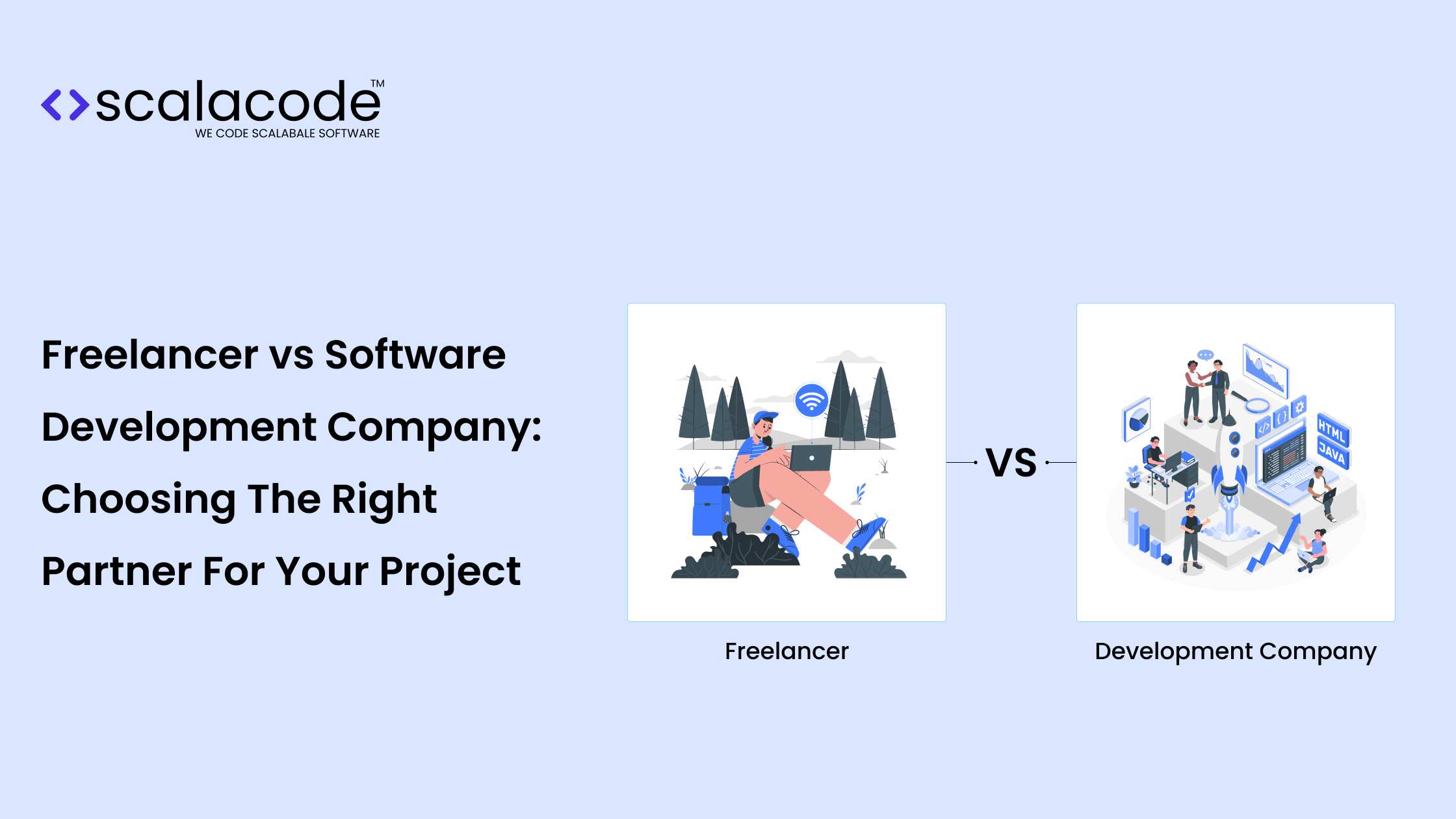As the world adjusts to the new normal, businesses have recognized the need to embrace technology to maintain their edge in the market. The custom software development industry has been gaining importance, with a market size of USD 24.46 billion in 2021.
The market is anticipated to experience a fantastic growth rate of 22.3% CAGR from 2022 to 2030 as we go into the future year. This rapid expansion reflects the surging demand for technology-driven solutions.
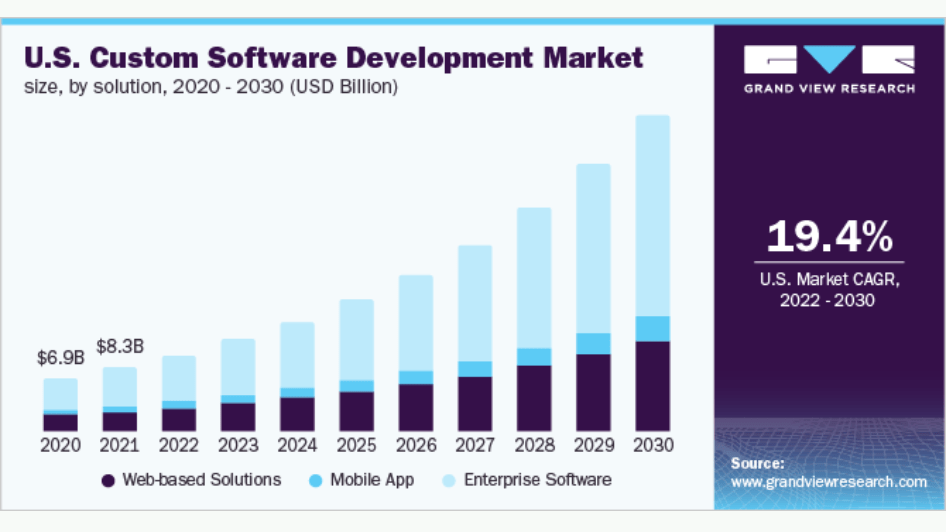
However, business owners often encounter a significant challenge: their inability to develop software independently. As a result, they depend on skilled technical professionals to create customized software products.
But who should they hire? Should they opt for a proficient freelancer or a reputable software development company?
It’s tough to make a decision, right? Each option—freelancers and software development companies have its own set of advantages and disadvantages.
So, if you are facing the same dilemma (who to pick), here is an in-depth article that deals with the topic- Freelancer vs. Software Development Company. Keep reading until the end to find the right development partner for your project.
Freelancer vs. Software Development Company: What defines a freelancer?
A freelancer is someone who works independently without being committed to a particular employer or company. They offer their services to clients on a project or contract basis, often working remotely from their own location.
Besides contributing over $1.4 trillion to the US economy, the steady increase in the number of skilled individuals taking up freelancing every year has made freelancers the favorite to become the US majority workforce within the next few years.
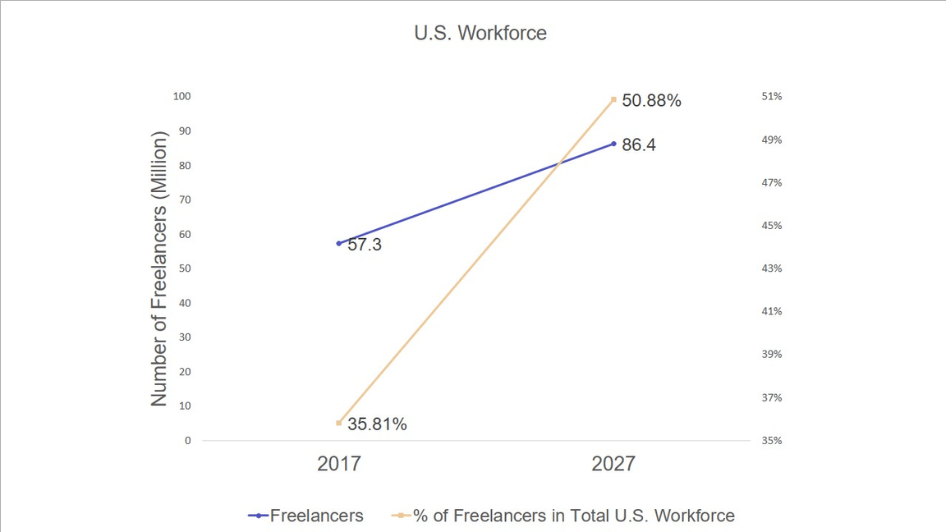
Among the top 20 in-demand skills for freelancers, 12 are related to development. This highlights the high demand for freelance software developers, driven by the increasing need for businesses to establish an online presence and develop software applications.
Also, in that top 20 in-demand skills for freelancers list, when hiring freelancers, companies often prioritize skills such as Amazon DynamoDB, Blockchain, Angular, Computer Vision, React Native, Go, and many others that are related to various technologies and IT.
The rise of freelance software development reflects the evolving needs of businesses in the digital era when technology is essential to their survival and expansion.
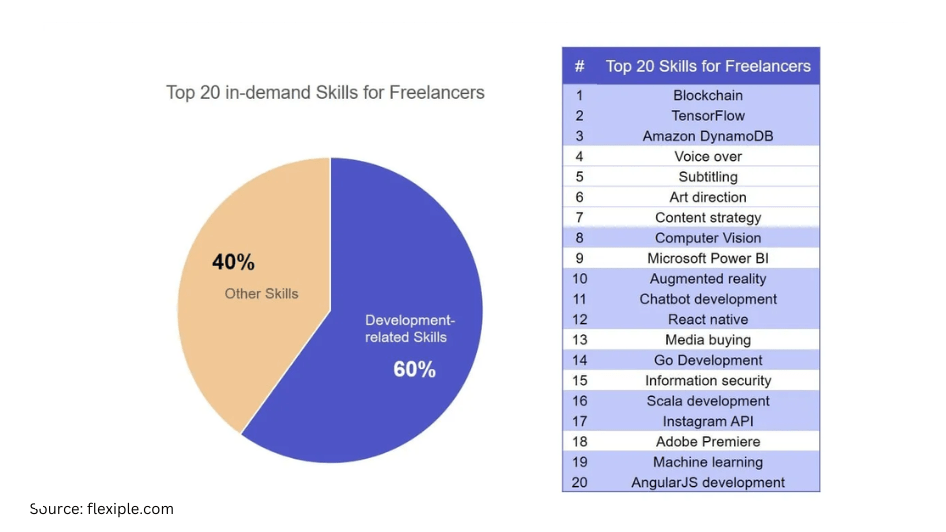
Freelancer vs. Software Development Company: What defines a Software Development Company?
A software development company is a business that provides a range of software development services to clients. These services include:
- Software development consulting
- Project management
- Wireframing & Designing
- MVP development
- Full-fledged software development
- Testing
- Deployment, and more.
These services are for a variety of clients. Unlike a freelancer who works independently, a software development company is typically made up of a team of developers, designers, project managers, and other professionals who work together to create high-quality software solutions.
Freelancer vs. Software Development Company: A Comprehensive Comparison Across Multiple Dimensions
Let’s examine how each option fares in comparison to others based on the crucial criteria to consider when developing a software product.
1. Freelancer vs. Software Development Company: Cost of Hiring
When considering costs, the cheapest option among the two choices is undoubtedly the freelancer. As per one of the popular freelancing platforms -Upwork, most freelancers charge hourly rates ranging from $15 to $30/hr.

Comparatively, an outside software development company may initially appear more expensive. In the United States, the hourly rate for software developers on average is $46/hr.
However, the typical range falls between $30 and $70 per hour. The hourly rates can fluctuate even more depending on:
- the developers’ experience levels
- the regions in which they work.
Senior developers are likely to earn a significant amount more than intermediate or junior developers.
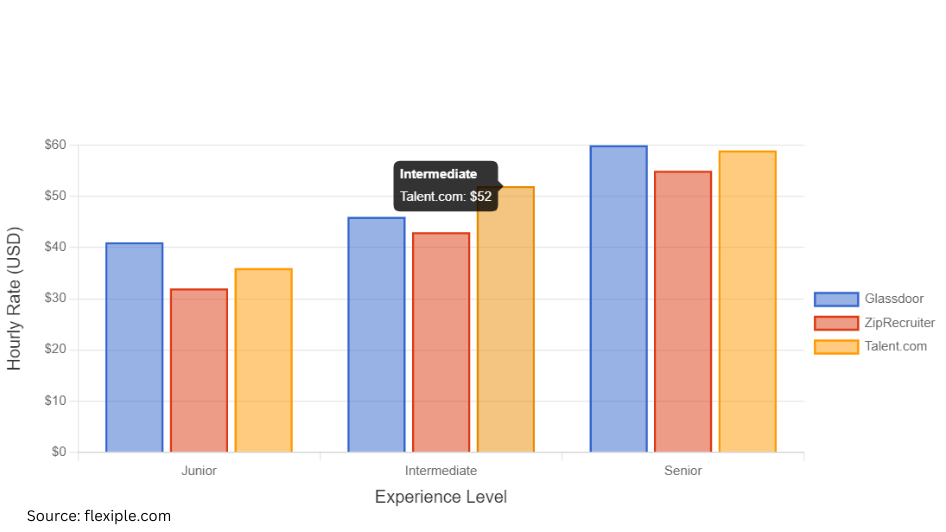
The advantage of engaging a reputed software development partner lies in their ability to provide specialists for each area of development, eliminating the need for you to manage a diverse team of freelancers or internal employees.
Key Takeaway:
Considering this, it’s crucial to ponder the value of your own time. With an outsourcing software development company, you can avoid the need to invest your valuable time in supervising and coordinating a team of freelancers or developers. Instead, you can rely on the expertise and specialized resources of a development partner.
2. Freelancer vs. Software Development Company: Working Principle
Software development agencies have long been trusted recourses for product development, mobile app development, web development, or any other digital transformation projects.
With their year-long expertise, these agencies consistently deliver excellent results, making them the safer yet the right option for any kind of professional services.
Experienced software developer firms have a proven track record of successful collaborations with a diverse range of clients over time. They have tackled similar projects to your business niche, and their extensive portfolio is supported by:
- case studies
- testimonials
- client reviews
However, freelancers, on the other hand, cannot provide all the necessary resources. They may be experts in one or two areas of development.
You may have to hire multiple freelancers to complete a project, which can be time-consuming and challenging to manage. Coordinating multiple freelancers lead to:
- communication gaps
- misalignment in the project’s vision
- lack of accountability
Furthermore, freelance developers bid on projects, screen clients, and showcase their best work in interviews. Whereas, professional companies offer different versions based on pricing needs. It’s important to communicate your requirements clearly to avoid confusion and revisions.
Thus, avoid getting caught in a bidding war for the lowest price. Choosing a cheaper option may result in substandard software.
Key Takeaways:
Trusting freelancers can be challenging due to limited means of verifying their expertise unless they have significant industry recognition. In terms of expertise, software development agencies excel.
They carefully recruit the most skilled developers, ensuring your project is in capable hands. In addition, agencies strive to establish long-term relationships with their clients, unlike freelancers who constantly search for new prospects.
3. Freelancer vs. Software Development Company: Search for Talent
Engaging agencies to handle talent acquisition streamlines the process, allowing you to effortlessly assign projects and await their completion by the designated deadline. This efficient approach saves time and eliminates the need for extensive involvement on your part.
In contrast, collaborating with freelancers necessitates an intricate search for the ideal match to meet your project requirements. This messy endeavor involves sifting through numerous candidates to find the perfect fit.
Although, as per Zippia, the freelance workforce distributions across the United States are as follows:
- 36% of freelancers are diversified workers
- 21% of freelancers are moonlighters
- 32% of freelancers are independent contractors.
- 5% of freelancers are temporary workers
- 6% of freelancers are freelance business owners
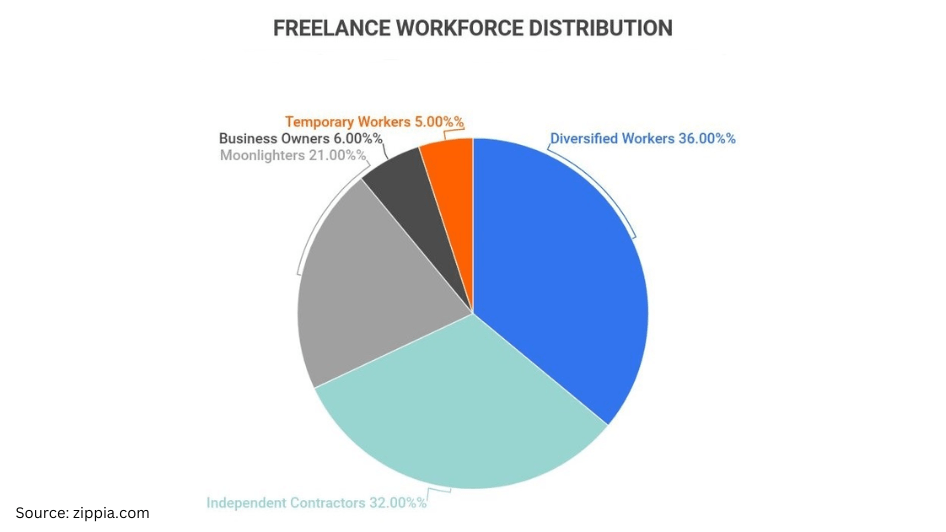 All-in-all, the selection process may entail trial-and-error, as you assess various freelancers’ abilities and suitability for the task at hand.
All-in-all, the selection process may entail trial-and-error, as you assess various freelancers’ abilities and suitability for the task at hand.
Key Takeaways:
Opting for agency involvement offers the advantage of a hassle-free workflow while working with freelancers requires a more involved and intricate selection process, accompanied by potential iterations and adjustments along the way.
4. Freelancer vs. Software Development Company: Development Time
The duration of each project varies based on the project’s requirements, scope, and more spanning anywhere from one to nine months. Whereas, a survey, has found that custom software falls within an average of 4.5 months.
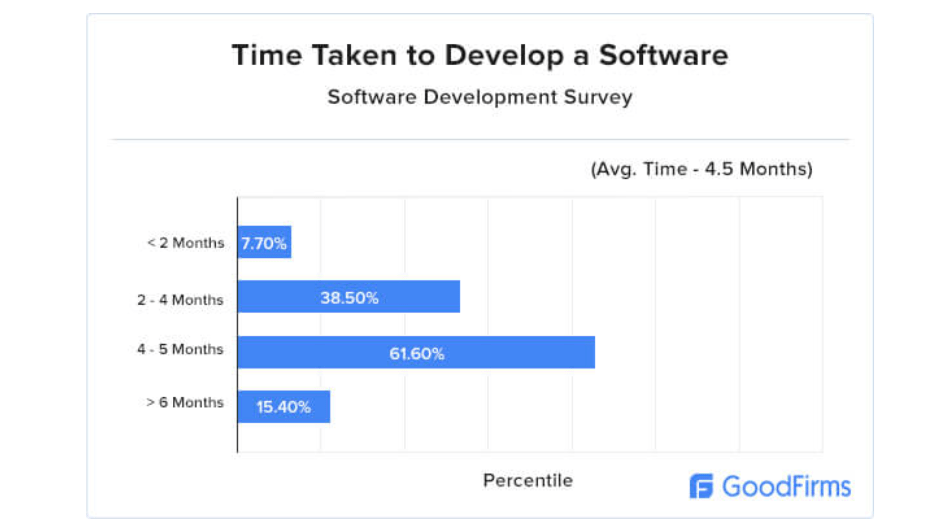
Determining the timeline for deployment is a crucial consideration in the development process. When time is of the essence, the availability and commitment of the chosen professionals play a significant role.
Freelancers often divide their time among multiple projects, which can lead to potential delays and complications. Moreover, if a freelancer is unavailable due to sick or other reasons, finding a suitable replacement becomes challenging.
Consequently, if timeliness is a critical factor for your project, freelancers may not be the optimal choice.
In contrast, software development firms with a substantial workforce of ten or more developers can establish dedicated development teams. These teams work exclusively on your project, minimizing interruptions and making steady progress toward deployment.
Key Takeaways:
The decision regarding outsourcing becomes a more appropriate choice, as various factors such as project timeline, team availability, and organizational size come into play. However, freelancers are considered a better option when projects need short-term development.
5. Freelancer vs. Software Development Company: Reliability
Beyond budget considerations, the primary concern for many companies seeking software development lies in the reliability of the agency or freelancer responsible for the project.
Software development companies, in particular, offer a high level of dependability due to their structured approach within the entire work ecosystem.
Agencies establish themselves as reliable entities by virtue of their systematic methodologies. Their well-defined processes and workflows instill confidence in clients, ensuring that projects are handled efficiently and with consistent quality.
In contrast, freelancers often face perceptions of being less reliable compared to agencies, and there are various reasons behind this perception.
- Freelancers may lack a structured approach when it comes to project management.
- Without an established system in place, their work can be subject to inconsistencies and haphazard organization.
- Furthermore, since freelancers often juggle multiple projects simultaneously, their focus on individual tasks can be diminished.
With divided attention, the level of dedication and thoroughness for specific projects may be compromised, leading to concerns about reliability.
Key Takeaways:
Companies often prioritize agencies due to their proven reliability and systematic work approach, while acknowledging the potential challenges associated with freelancers in terms of consistency and focus.
6. Freelancer vs. Software Development Company: IP Protection & Data Security
In terms of IP protection and data security, both freelancers and software development companies have their own advantages and disadvantages. Freelancers may have less stringent security measures in place compared to software development company.
Due to the lack of a formal structure, freelancers may lack adequate security measures. Whereas, in an IT company, there is a set of established rules and in fact, they have dedicated security teams to ensure that your data is kept secure and safe.
It is a global trend that businesses allocate a minimum of 12 percent of their overall IT budget toward ensuring information security.
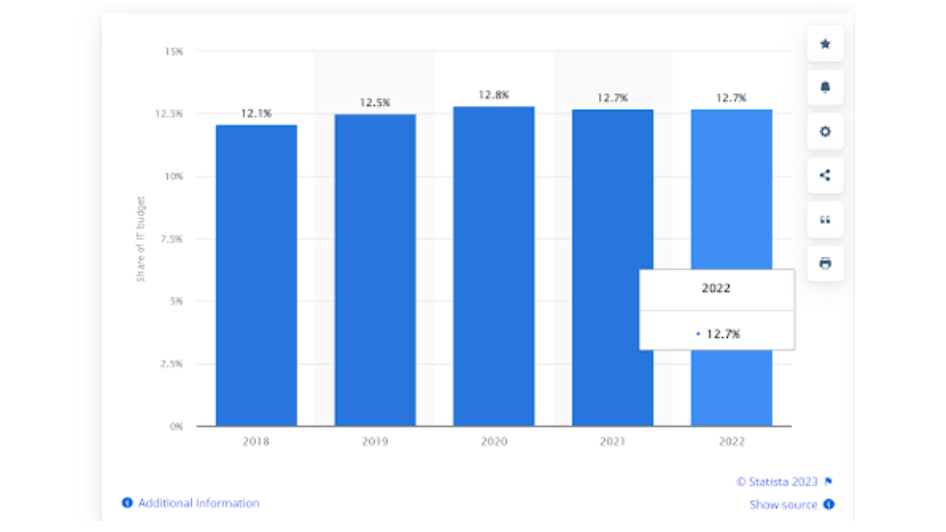 When collaborating with an offshore software development partner, your intellectual property (IP) ownership is legally safeguarded through strict adherence to a Non-Disclosure Agreement (NDA). This ensures complete confidentiality and protects your valuable ideas and proprietary information.
When collaborating with an offshore software development partner, your intellectual property (IP) ownership is legally safeguarded through strict adherence to a Non-Disclosure Agreement (NDA). This ensures complete confidentiality and protects your valuable ideas and proprietary information.
Key Takeaway:
It is up to the client to ensure that their data and IP are protected, regardless of whether they are working with a freelancer or a software development company. It is important to do your due diligence, research your potential partners thoroughly, and establish clear expectations and agreements before any work begins.
7. Freelancer vs. Software Development Company: Networks
Another crucial aspect to consider when deciding between a freelancer and a reputed software development company is the network of connections. This aspect is often overlooked but holds significant value.
A reputed software development firm typically has a vast network of contacts that can be utilized throughout a project. For example, they may have a project coordinator who can help with acquiring funds or financing alternatives to back up your project.
By partnering with a development company, you can gain access to these valuable connections, saving you the trouble of building them from scratch. This can greatly simplify your project’s progress and increase its chances of success.
Conversely, when working with freelancers, you’ll need to establish these connections independently, which can consume time and resources.
Key Takeaway:
The availability of connections and resources that a development company can offer is an essential factor in making an informed decision about the best approach for your project. It can contribute to smoother operations, improved efficiency, and better outcomes in the long run.
Freelancer vs. Software Development Company: Comparison Table
| Dimension | Freelancer | Software Development Company |
| Cost of Hiring | Cheaper hourly rates | Potentially more expensive |
| Working Principle | Limited verification of expertise | Established experience and expertise |
| Search for Talent | Intricate and time-consuming search | Streamlined talent acquisition |
| Added Value | Limited industry knowledge | Potential industry insights and expertise |
| Development Time | Potential delays and complications | More reliable and dedicated timelines |
| Reliability | Perceptions of less reliability | Proven reliability and systematic approach |
| Training and Support | May not prioritize training or support | Varies depending on the company |
| Connections | Independent connections building | Established networks and connections |
Considering these criteria, carefully evaluate the strengths and weaknesses of freelancers and development companies to choose the best fit for your software development needs.
Factors To Consider When Choosing a Development Partner
When it comes to choosing a development partner, it’s crucial to consider several factors to ensure you make the right decision. Let’s explore some key considerations, backed by statistics and examples, to make this discussion more engaging:
Project Scope and Complexity:
Assess the scope and complexity of your project to determine whether a freelancer or a software development company is the better fit.
According to a survey conducted by Upwork, businesses prefer hiring freelancers for small and straightforward projects. Moreover, it also mentioned IT and Networking have the highest percentage of work done by freelancers:
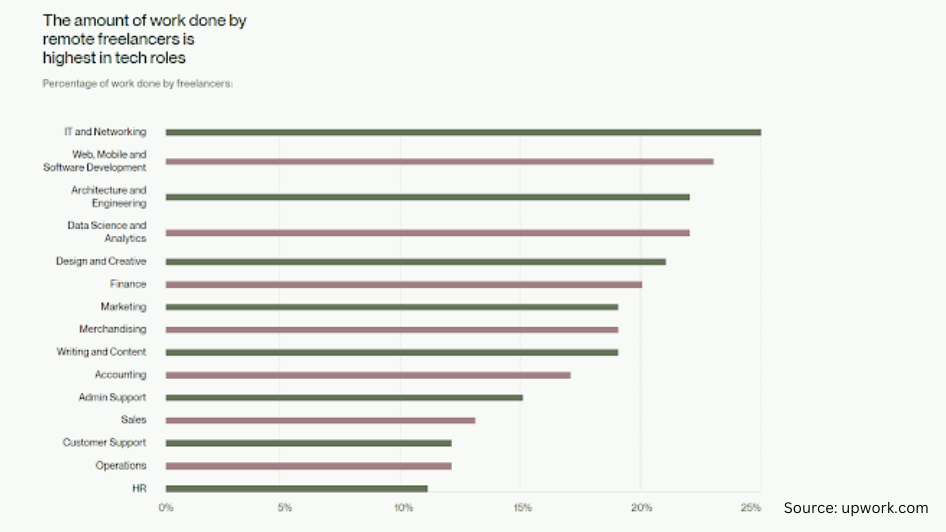 However, for complex projects requiring a diverse skill set, like building a custom e-commerce platform, partnering with a software development company can be more advantageous. They have a dedicated team with specialized expertise to handle intricate requirements efficiently.
However, for complex projects requiring a diverse skill set, like building a custom e-commerce platform, partnering with a software development company can be more advantageous. They have a dedicated team with specialized expertise to handle intricate requirements efficiently.
Expertise and Skills:
Evaluate the expertise and skills of potential development partners by examining their portfolios and client testimonials. Look for evidence of their experience in delivering projects similar to yours.
A study by Stack Overflow found that developers who actively participate in professional communities and showcase their work online tend to have stronger skill sets.
For example, if you’re developing a mobile app, consider a development partner who has successfully built and launched similar apps with positive user reviews.
Budget:
Determine your budget and find a development partner that fits within your financial constraints. While it’s true that software development companies typically charge higher rates compared to freelancers, they often provide comprehensive services, including:
- Project management
- Quality assurance
- Ongoing support
Consider the potential return on investment and long-term benefits of working with a reputable development company. On the other hand, if you have a limited budget and a relatively straightforward project, a freelancer can be a cost-efficient option.
Communication:
Effective communication is vital for project success. Look for a development partner who values open and transparent communication.
According to a survey conducted by Project Management Institute, projects with poor communication puts companies at US$75 million at risk.
Seek a partner who is responsive, proactive in sharing project updates, and willing to collaborate closely with you. For instance, ask potential partners how they ensure smooth communication and address any concerns promptly.
Availability:
Consider the availability of your development partner, especially if you have strict project timelines. Software development companies often have dedicated teams working full-time on projects, providing greater flexibility to meet deadlines.
In contrast, freelancers may have multiple commitments, potentially leading to project delays. When discussing project timelines with potential partners, inquire about their availability and ability to prioritize your project.
Also, read: An End-To-End Guide On Outsourcing Software Development Projects
Freelancer vs. Software Development Company: Final Call!
There is no thumb rule for choosing between a freelancer or a software development company. The right choice will depend on your project. You can go for a freelancer if you:
- Dealing with niche projects
- Smaller budget and seeking cost-effective solutions
- Engaging in short-term collaborations
- Navigating tight deadlines
- Ok with flexible timelines
Choose a reputed software development when:
- Have a multi-phase project
- Complex project
- Need different resources to accomplish project goals
- Prioritizing quality work
- Looking to work in structured processes
- Long-term project
- Dedicated full-time engagement from the development team
